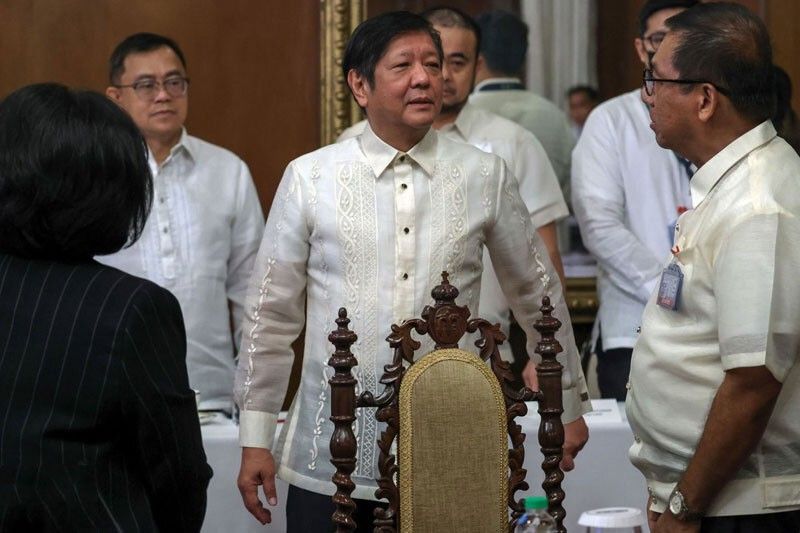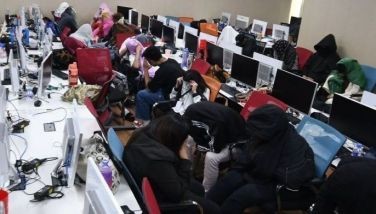21 UP economics professors buck Maharlika

MANILA, Philippines — Almost two dozen faculty members of the University of the Philippines School of Economics (UPSE) have urged President Marcos to reconsider the final approval of the bill creating the Maharlika Investment Fund (MIF), saying it poses “serious risks” to the country’s economy and public sector.
In a 25-page discussion paper released on Tuesday, 21 economics professors – including former socioeconomic planning secretary Ernesto Pernia – expressed grave concern over the proposed creation of a sovereign wealth fund.
“In our view, the MIF violates fundamental principles of economics and finance and poses serious risks to the economy and the public sector – notwithstanding its proponents’ good intentions,” they said.
The professors outlined their reservations into six key issues.
First, they noted MIF’s lack of a clear focus that has led to confusion even among its proponents and supporters.
It cited the statement of Bangko Sentral ng Pilipinas (BSP) Governor Felipe Medalla during a Senate hearing last May 29, in which he said that the MIF is “no longer a sovereign wealth fund. It’s more of a national development, investment fund.”
Because of the MIF’s confused goals, the professors said the second issue is it does not adequately articulate several implications of its “dual-bottom line objective” of earning commercial and economic returns.
They stressed that the MIF is not aligned with the Philippine Development Plan or the medium-term fiscal framework and that its proponents have yet to prove what it would “bring to the table.”
“What is the nature of financial and economic returns that the MIF is expected to generate? This is not threshed out in the MIF bill. This point is crucial since aiming for both financial and economic returns is far more complicated than aiming for just financial returns,” said the professors.
Due to unclear financial and developmental goals, they warned that the MIF could encroach upon the government’s budgetary process.
Third, the professors said the manner of funding the MIF “poses huge risks to our already strained public coffers and is vulnerable to moral hazard.”
“The lack of any surpluses necessarily forces the MIF to scour money from other agencies and corporations of government, posing risks on, say, state-run banks and even the BSP,” read the paper.
“Draining capital from state banks like the LBP (Land Bank of the Philippines) and the DBP (Development Bank of the Philippines) risks destabilizing these institutions and compromises their ability to meet BSP’s capitalization requirements,” it added.
Based on the approved version of the bill, among the sources of MIF’s seed capital are the national government, the two state-owned banks and other government-owned and controlled corporations.
According to the UP economics professors, transferring state-owned assets into the MIF poses “moral hazard” risks, defined as a concept “where one party is willing to take on more risk because it believes another party will bear the burden of those risks.”
“Note that there are no safeguards that penalize MIF’s managers should heavy losses be incurred due to poor or overly risky investment decisions. As it is, the bill does not spell out parameters that distinguish between poor fund management and general market downturns if the MIF doesn’t meet expected returns,” read the paper.
“In other words, it does not say how to determine whether a bad year for the MIF is due to mistakes made by those managing it or just because the local or global economy overall is performing poorly,” it added.
Red flags
The fourth issue raised by the professors were the red flags in the governance structure of the Maharlika Investment Corp. (MIC), which will manage the MIF.
They noted that all members of the board, including its “independent” directors, are presidential appointees, which they said could pave the way for politicization in its operations.
Fifth, given the economic headwinds and uncertainties worldwide, the professors said “it is unlikely that MIF will be able to ‘crowd-in’ investments and eke out returns that are large enough for the fund to grow substantially to finance development projects.”
“The current high (and rising) interest rate environment here and globally is a particularly important factor that could hamper crowding-in and erode the viability of the MIF,” they said.
“If, for example, the MIF issues bonds at higher interest costs, and the government has to borrow to implicitly bail out the MIF, this could threaten the financial viability of bank and non-bank institutions that choose to hold MIF-issued bonds,” added the professors.
Finally, they noted that preoccupation with what they described as a “defective proposal” diverted attention from more vital and urgent national agenda, such as the needed reform in the retirement and pension system for military and uniformed personnel.
“By choosing to pour their energies into the MIF, lawmakers and the economic team are only adding to – and not abating – the nation’s fiscal strain,” read the discussion paper.
“In addition, by committing P50 billion from the national government, the MIF takes away precious funds from the public coffers – funds that could be spent instead on myriad developmental projects with surer or more tangible returns, like conditional cash transfers, nutrition programs, universal health insurance or active transportation projects,” it added.
The professors urged Marcos to present before the public “a clear and solid rationale” for setting up the MIF.
They also called on former and present colleagues who are part of the Marcos economic team to reconsider their position on the matter and advise the President accordingly.
“We also call on our legislators to give more detailed explanations on their positions on the MIF, and explain how and why they were persuaded by the arguments used by the President to justify the urgency of passing the legislation,” said the professors.
Aside from Pernia, the discussion paper was also signed by UPSE faculty Ma. Joy Abrenica, Luzeta Adorna, Patricia Coseteng, Emmanuel de Dios, Marian de los Angeles, Noel del Castillo, Benjamin Endriga, Laarni Escresa, Jonna Estudillo and Maria Socorro Gochoco-Bautista.
Other signatories included Aleli Kraft, Alice Lee, Adrian Mendoza, Jan Carlo Punongbayan, Renato Reside Jr., Anthony Sabarillo, Orville Jose Solon, Gerard Suanes, Elizabeth Tan and Mariel Jances Nhayin Yamashita.
The professors clarified the paper was written in their autonomous personal capacities and does not necessarily represent the official views of UPSE and the entire university.
COA flags GSIS over uncollected P47 billion
Meanwhile, the Commission on Audit (COA) has admonished the Government Service Insurance System (GSIS) for “inefficient” monitoring and collection system that resulted in the accumulation of overdue loans uncollected from members and private companies, amounting P45.583 billion and P2.114 billion, respectively.
In its 2022 annual audit report on the GSIS, the COA noted that out of the total of P366.637 billion in outstanding loans of GSIS members nationwide, P45.583 billion of it was already “due and demandable” but remained uncollected as Dec. 31, 2022.
The COA said this was despite many ways to collect the loan payments such as “through salary deduction for active members or pension deduction for retirees or pensioners.” – Cecille Suerte Felipe, Elizabeth Marcelo
- Latest
- Trending




























